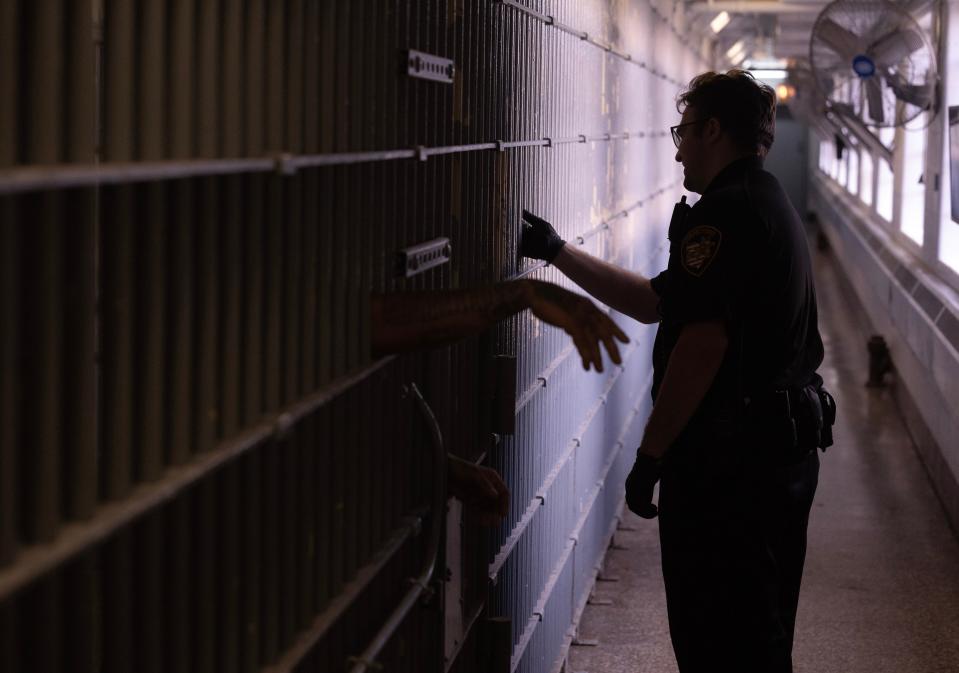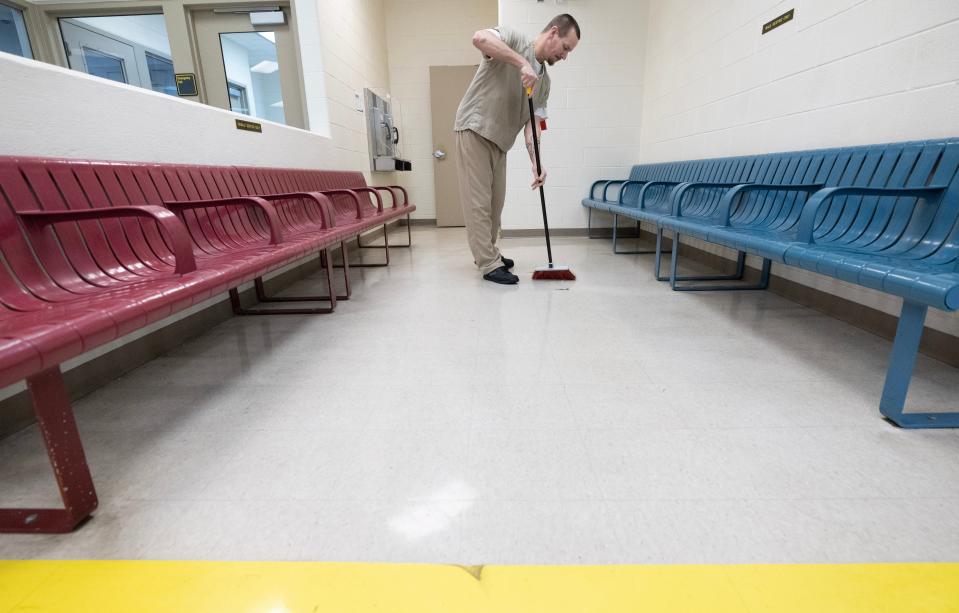'I really want to know.' Family seeks answers in death at Stark County Jail

David McKain talked openly with his son about wanting to seek treatment for mental health issues shortly before McKain was booked into the Stark County Jail late last year.
He asked his son, 25-year-old Keenan Walker, for advice on where to go for help. And he admitted that he was worried about an upcoming court date.
"He knew there were going to be consequences," said Victoria Walker, McKain's ex-wife and Keenan's mother.
Five days after he was brought to the jail on escape and parole violation charges, McKain, 41, took his own life — becoming the sixth inmate booked at the facility to die since May 2014.
McKain died Dec. 3 in a Canton hospital after life support was withdrawn. Over the past four years, at least 220 people died in Ohio's county jails.
There still are questions about whether corrections officers had made timely checks on McKain as required. A 50-year-old corrections officer, Jason W. Rohr, has been charged with records tampering related to his death. Rohr has pleaded not guilty.
“I really want to know and truly understand the whys and the how this happens in jail, not because I want to point blame at anyone," Victoria Walker said in the family's first public comments since McKain's death. "It’s more because the only way that we can make effective changes is to actually understand exactly the whys and the hows so that you can make those changes and put in place ... better, more effective prevention measures ... so no other families have to go through what they’re going through, what (Keenan’s) going through.
“There can’t be a lack in what anyone’s role is, because as you see there can be deadly consequences for such," added Walker, a behavioral therapist who formerly taught kindergarten.
Sheriff George Maier: 'Nothing's foolproof.'

Stark County corrections officers do rounds every 20 minutes to check the general population, and every 10 minutes for inmates with a past suicide attempt or known suicidal thoughts.
Still, Sheriff George Maier said, "Nothing’s foolproof."
Not the crisis intervention training that teaches guards and deputies how to deal with people who are having a mental health crisis. Not the morning briefings that tell jail staff which inmates must be kept apart from each other. Not the system that separates those who might harm themselves or others from the general jail population. And not the body scanner used to detect contraband such as drugs or weapons.
The Sheriff's Office noted there were 88,119 inmates booked at the jail between May 2014 and May 2024, with the six deaths being 0.006% of the overall number of inmates. Four of those involved suicide, while two were of natural causes.
The Sheriff's Office also said the local percentage is lower than the national average for suicides alone at local, state and federal facilities, which stands at 0.048%.
Jails are dangerous places, with 40% of the inmates having mental health issues and 40% having a substance use disorder.
“Last year, we detoxed about 3,200 individuals," Maier said. "There's probably not a clinic or a hospital in the county that's detoxing that many people.
“Everything we do is really designed to keep not only the inmates safe, but our staff safe," he said.
The sheriff said the job begins with screening the roughly 8,500 people who are booked at the jail in a year. Each gets checked by three people for medical and mental health issues before moving into housing units.
Capt. Jeff Begue, who has worked at the jail for 25 years and now serves as assistant commander, said their background is reviewed, going back 10 years, to see if they have a history of violence or mental health issues. Those who are chronic drug and alcohol users are watched more closely. Two nurses are on-site at all times.
Walkers hope people experiencing mental health issues would get better treatment

McKain had a troubled past. He was sentenced to six years in prison in 2016 for felonious assault and other charges stemming from a car chase along Interstate 77 that injured a state trooper. In court, he said was high on heroin at the time.
Despite those troubles, his family said he was a good person.
"When he would be in jail, I would communicate through letters and phone calls," Keenan Walker said. "He would always talk to me and ask me how I was doing in school. He would send me little cards.”
McKain was “truly was a caring person," Victoria Walker said. "He loved Keenan. Keenan was like his twin; that’s what everybody says. They looked so much alike. He loved his mom.”
The Walkers said they hope people experiencing mental health issues would get better treatment and rehabilitation in the mental health and criminal justice systems so they do not continually cycle through jails and prisons as McKain did.
“I think a lot of it boils down to just having compassion and understanding and listening to understand because nobody knows or exactly understands exactly what it’s like to walk in someone else’s shoes," Victoria Walker said.
What programs does the Stark County Jail offer inmates?

Maier, Begue and jail Commander Timothy Miller said the county jail does have programs to help inmates, including one designed specifically to help them function after they leave.
Programs include Alcoholics Anonymous, Narcotics Anonymous and parenting classes. Inmates can visit a virtual law library or study for a General Educational Development (GED) certificate on digital tablets.
The Stark Adult Recovery Program is designed to help inmates survive and thrive following incarceration.
Miller said the program is 30 to 45 days long and designed to treat addiction to alcohol and other drugs. Two substance abuse counselors run the program. A monthly community fair allows inmates to speak with representatives of Goodwill, OhioMeansJobs and other agencies. They offer help getting housing, filling out job applications and applying for drivers’ licenses. A total of 14 agencies attended the last community fair.
“Aftercare is very important," Miller said. "We can keep people sober for 30, 45 days. The challenge is keeping them on the right track once they leave the facility. None of our participants who are successful leave the facility without having an aftercare plan, which is very important.”
Maier said the goal is to reduce repeat offenses among a population of people who may have alienated friends and family, burnt bridges, lost jobs, lost drivers' licenses and aren’t seeing their children.
Of those who complete the STAR program, only 12% return to the Stark County Jail within two years, Miller said.
How could renovation make the jail safer?

A proposed renovation of the county jail would replace the 38-cell housing unit currently used for those who show signs of causing harm, Maier said.
The new unit would be designed in a pod style. Jail pods typically feature a central control area surrounded by cells. Staff can more easily watch inmates at all times than they can in cells arranged on either side of a linear hallway.
Although the jail renovation is still being designed, the sheriff said, the existing area for those inmates would be converted to a clinic, replacing a smaller area now devoted to that purpose.
Maier is also proposing that the kitchen be renovated. He said it was built to feed 250 inmates in a facility that now has a capacity of 526 and usually houses about 450.
Victoria Walker expressed the hope that jail inmates will be safer in the future so that no one else has to suffer the loss that McKain's loved ones felt.
“You are expecting that they’re safe, or they’re being cared for," she said. "They’re human, too. They may have made mistakes, or did dumb things. They’re still people and they’re still special to somebody.”
Reach Nancy at 330-580-8382 or nancy.molnar@cantonrep.com. On X, formerly known as Twitter: @nmolnarTR.

This article originally appeared on The Repository: David McKain's family waits for answers in his death at Stark Jail

